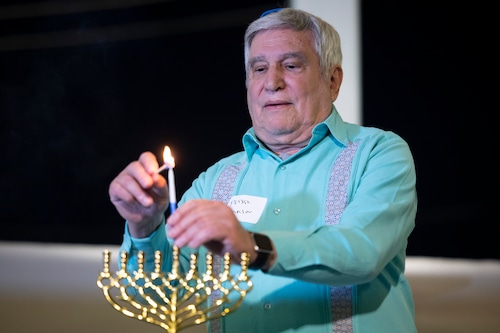Christmas Day marks the start of Hanukkah, the eight-day Festival of Lights in Judaism, which has only occurred four times since 1900.
Some rabbis believe that the two major holidays’ crossing offers a fortunate opportunity for interfaith interaction.
According to Rabbi Josh Stanton, a vice president of the Jewish Federations of North America, this can be a significant chance for education, cooperation, and harmony. His organization represents 146 local and regional Jewish federations, and he is in charge of interfaith projects with them.
“Learning deeply from each other is the goal, not proselytizing,” he stated. The way you see yourself is how others see you.
One instance of unity is the Chicanukah event that was held Thursday night in Houston by a number of Jewish organizations, uniting the city’s Jewish and Latino communities for a celebration of the holiday that transcends cultural boundaries. The location is the Holocaust Museum in Houston.
A latke bar with guacamole, chile con queso, pico de gallo, applesauce, and sour cream was one example of the cuisine that blended the two cultures. Sufganiyot, a Hanukkah delicacy, and bu uelos were doughnut-like treats. Additionally, the mariachi band attempted to perform the Jewish folk tune Hava Nagila.
According to Erica Winsor, public affairs officer for the Jewish Federation of Greater Houston, “our shared values—our faith, our families, and our heritage—are what really bring us together.”
Hanukkah, also known as Chanukah or other Hebrew transliterations, is the festival of lights in Judaism. Jews get together with loved ones to light an extra candle in the menorah, a multibranched candelabra, on eight successive evenings.
Hanukkah, which translates to “dedication” in Hebrew, commemorates the rededication of the Jerusalem Temple in the second century BC, following its liberation from foreign occupiers by a small band of Jewish warriors.
They lit the menorah and it remained lit for eight days using the small amount of ritually pure oil they discovered in the temple. The custom of burning a candle every night and the focus on preparing meals in oil, such latkes, which are potato pancakes, honor this oil’s extraordinary durability.
When is Hanukkah 2024?
The holiday’s dates are based on the Hebrew month of Kislev, which in the Gregorian calendar often falls between November and December.
Hanukkah will be observed this year from December 25, 2024, until January 2, 2025.
Why is Hanukkah so late this year?
The straightforward explanation is that the Gregorian calendar, which places Christmas on December 25, is not in line with the Jewish calendar, which is based on lunar cycles. The 25th day of the Jewish month of Kislev, which falls between late November and late December on the Gregorian calendar, is always when Hanukkah starts.
Does Hanukkah observance vary?
The notion of bringing light into the dark and highlighting the transformative power of even a little, unconventional endeavor is shared by Jews of all religious observances, including Orthodox, Conservative, and Reform.
Because of this, most people begin with one candle and add one more each night while reciting or singing special blessings, despite the Talmud showing a disagreement over the lighting order.
The newest light is always lighted first since the candles are lit from left to right on the menorah but added from right to left. The shamash, the candle from which all other candles are lit, occupies the ninth branch of the particular menorah used during Hanukkah.
Real flame candles are required by tradition, although for safety considerations, some people use electric candles in public settings like hospitals.
How is Hanukkah celebrated?
To represent the spread of God’s light to all nations, a menorah is lit in every home and is customarily placed where it can be seen from the outside, like a doorway or ledge.
Menorah illumination in parks and city streets, notably in front of public landmarks, has grown in popularity in recent years in many nations.
In addition to lighting menorahs, many individuals celebrate by giving to charities and other charitable deeds, which reflects the idea that God has called Jews to improve the lot of everyone on Earth.
More Life & Culture news
Note: Every piece of content is rigorously reviewed by our team of experienced writers and editors to ensure its accuracy. Our writers use credible sources and adhere to strict fact-checking protocols to verify all claims and data before publication. If an error is identified, we promptly correct it and strive for transparency in all updates, feel free to reach out to us via email. We appreciate your trust and support!

